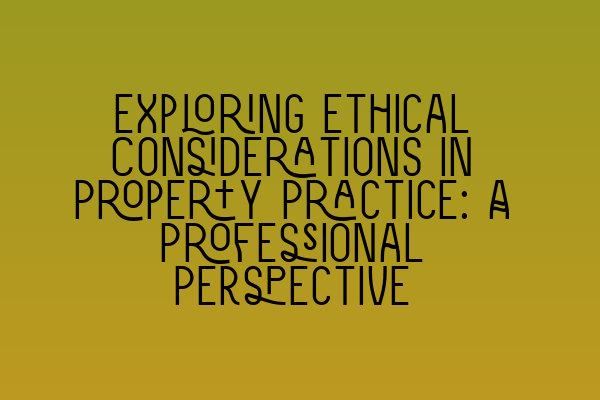Exploring Ethical Considerations in Property Practice: A Professional Perspective
When it comes to property practice, it is crucial to not only have a good understanding of the legal and technical aspects but also to consider the ethical implications involved. As a solicitor specializing in property law, I have encountered various ethical dilemmas and challenges that require careful navigation. In this blog post, I will explore some important ethical considerations that property practitioners should keep in mind.
The Duty of Confidentiality
One of the fundamental ethical principles in property practice is the duty of confidentiality. As solicitors, we are entrusted with sensitive information and must ensure its confidentiality. This includes safeguarding client details, transactional documents, and any other information obtained during the course of representation. Breaching confidentiality can not only harm the client’s interests but also damage the solicitor’s professional reputation.
It is important to remember that the duty of confidentiality extends beyond the solicitor-client relationship. Any disclosure of confidential information to third parties without proper authorization can be seen as a breach of ethical obligations. Therefore, it is essential to exercise caution and always seek appropriate consent before sharing any confidential information.
The Conflict of Interest
Another ethical consideration in property practice is the avoidance of conflicts of interest. A conflict of interest can arise when a solicitor’s personal or financial interests interfere with their duty to act in the best interests of their client. Identifying and navigating potential conflicts of interest demands a high level of professionalism and integrity.
For example, if a solicitor has previously represented a potential buyer and is now asked to act on behalf of the seller, a conflict of interest may exist. In such cases, it is important to disclose the conflict to all parties involved and consider withdrawing from the representation if necessary. By prioritizing the client’s interests and avoiding any personal biases, property practitioners can maintain the integrity of the profession.
Transparency and Full Disclosure
Transparency and full disclosure are essential in property practice to ensure all parties have a clear understanding of the transaction and its potential risks. As a solicitor, it is crucial to provide accurate and comprehensive advice to clients, ensuring they are fully informed before making any decisions.
When it comes to property transactions, legal and financial complexities can arise, making it even more crucial to provide clear explanations and assist clients in understanding the implications of their actions. Transparency not only fosters trust between the solicitor and the client but also demonstrates a commitment to ethical practices.
Professional Development and Continuing Education
Ethical considerations in property practice go beyond legal obligations and require practitioners to continuously develop their knowledge and skills. Staying up-to-date with the latest developments in property law, including changes in legislation and industry practices, is crucial for providing ethical and effective representation to clients.
Continuing education can be achieved through attending relevant seminars, workshops, and conferences, as well as participating in professional organizations or online forums. By investing in professional development, solicitors can enhance their understanding of ethical considerations and ensure their practice aligns with the highest professional standards.
Conclusion
As property practitioners, it is essential to recognize and address the ethical considerations that arise in our profession. By upholding the duty of confidentiality, avoiding conflicts of interest, promoting transparency and full disclosure, and investing in our ongoing professional development, we can navigate the complex ethical landscape of property practice.
For more information on related topics, check out the following articles:
